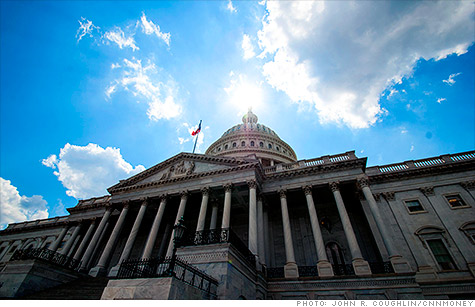
Lawmakers, in an effort to force themselves to be fiscally responsible, put in place a destructive series of spending cuts that they always expected to replace. Except they haven't.
NEW YORK (CNNMoney) -- It's mindless, confusing and costly. It will likely result in private-sector and government job loss. It will hurt the economy.
And Congress can't agree on how to replace it.
That's where things stand with the "sequester" -- a series of automatic federal spending cuts equally divided between defense and non-defense programs.
The cuts, set to take effect in January, start with a $109 billion reduction in 2013 and total $1.2 trillion over a decade, including interest savings.
Analysts, economists and industry executives have repeatedly highlighted the many problems associated with reducing deficits in such a ham-fisted way. Now the cries for help are getting louder.
"Disruptive, chaotic ... lunatic," said Steve Bell, senior director of economic policy at the Bipartisan Policy Center and former staff director at the Senate Budget Committee.
The idea of imposing automatic spending cuts grew out of the 11th-hour deal Congress and President Obama struck last summer to resolve the debt ceiling crisis. In other words, policymakers got out of one self-made mess by crafting a plan that is triggering another.
"[The sequester's] mechanistic, straitjacket approach will leave almost no room for program managers to protect their most critical activities by sacrificing those that are less essential," Bell and several co-authors wrote in "Indefensible," a Bipartisan Policy Center report about the cuts.
Federal worker furloughs: Much has already been written about the potential for layoffs at private-sector defense contractors, notices of which could go out as soon as September.
There's been less discussion about the potential effect on workers at many federal agencies.
The sequester would put the kibosh on any raises and necessitate hiring freezes as early as this fall, Bell said. And federal agencies may have to furlough workers at some point during fiscal year 2013, which starts on Oct. 1 of this year.
Why are furloughs a possibility? In part federal agencies and departments that will have to make spending cuts aren't allowed to cut pay, and firing staff is time-consuming and costly.
The cost of savings: Saving money under the sequester may not come cheap.
"[A]lthough it is an attempt at deficit reduction, the arbitrary nature of the sequester cuts inevitably will result in additional undue costs ... partially counteracting the savings," the Bipartisan Policy Center report said.
Such undue costs might include penalties for breach of contract. While most federal contracts are written for one year, some really big ones are multi-year contracts, especially those for things like weapons systems. Should any of them be cut short, the government could face penalties.
"Inevitably because of termination costs and other fees associated with contracts, you may wind up terminating more than $1 a program to get $1 of savings," Tom Davis, vice president of strategic planning at defense contractor General Dynamics, said at a Brookings Institution seminar this week.
Mass confusion: "The only thing that's really known about sequestration right now is that something happens on January 2," Davis said. "What does that mean for specific contracts, specific programs, specific locations, specific facilities?"
Government contractors are in the dark because the federal agencies with which they do business are also in the dark.
The president and Congress have some discretion to exempt certain areas of the budget from cuts -- such as military personnel and overseas contingency operations, such as those in Afghanistan. Many people expect that to happen.
But that only means the cuts will come down even more heavily in the non-exempt areas.
Appropriators in the House and Senate -- the ones who decide how much money everyone gets -- will lay down the law about where those cuts will come from. And the White House Office of Management and Budget must make sure federal agencies abide by that law and offer them guidance on how to do so.
But there's little expectation that clear details will be forthcoming anytime soon.
In the meantime, a few lawmakers -- including key members of the Senate and House Armed Services committees -- argue that Congress can't wait to deal with the issue until after the election, directly contradicting what legislative leaders have been saying will happen.
No comments:
Post a Comment